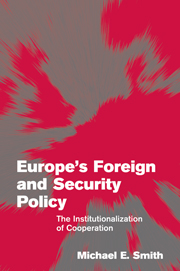Book contents
- Frontmatter
- Contents
- List of tables
- Acknowledgments
- List of abbreviations
- Introduction: foreign and security policy in the European Union
- Part I Institutions and foreign policy cooperation: the theoretical and empirical terrain
- Part II The institutionalization of cooperation
- 3 Origins: intergovernmentalism and European Political Cooperation
- 4 Information-sharing and the transgovernmental EPC network
- 5 Norms, rules, and laws in European foreign policy
- 6 Organizations and European foreign policy
- 7 Toward governance: the Common Foreign and Security Policy
- Part III Residual institutional issues
- Conclusion: beyond the CFSP: institutions, defense, and the European identity
- References
- Index
3 - Origins: intergovernmentalism and European Political Cooperation
Published online by Cambridge University Press: 21 January 2010
- Frontmatter
- Contents
- List of tables
- Acknowledgments
- List of abbreviations
- Introduction: foreign and security policy in the European Union
- Part I Institutions and foreign policy cooperation: the theoretical and empirical terrain
- Part II The institutionalization of cooperation
- 3 Origins: intergovernmentalism and European Political Cooperation
- 4 Information-sharing and the transgovernmental EPC network
- 5 Norms, rules, and laws in European foreign policy
- 6 Organizations and European foreign policy
- 7 Toward governance: the Common Foreign and Security Policy
- Part III Residual institutional issues
- Conclusion: beyond the CFSP: institutions, defense, and the European identity
- References
- Index
Summary
As war in the Middle East threatened to erupt during the first week of June 1967, leaders of the Six were settling down into one of their periodic intergovernmental summits only a few hundred miles away in Rome. Although fully aware of the different preferences among EU states regarding this volatile region, and of the apparent intractability of the political problems in the Middle East, Germany suggested the Rome summit might be a rare opportunity for the Europeans to speak with a single voice about the tense situation. However, France, under the leadership of de Gaulle, proposed instead a four-power summit (France, the Soviet Union, the UK, and the US) to discuss a settlement to the conflict, but this offer was rejected by the Americans. This failure on the part of the EU even to attempt coordination on its own during such a major crisis, and the rejection of French leadership, both eased the way for the creation of EPC three years later. As German chancellor Kurt Kiesinger recalled, “I felt ashamed at the Rome summit. Just as the war was on the point of breaking, we could not even agree to talk about it” (Ifestos 1987: 420).
The dynamics of the Rome summit during the 1967 Six-Day War also illustrate three important circumstances facing EU governments as they began to think more seriously about coordinating their foreign policies.
- Type
- Chapter
- Information
- Europe's Foreign and Security PolicyThe Institutionalization of Cooperation, pp. 63 - 89Publisher: Cambridge University PressPrint publication year: 2003

